Cohere

- Description
- Videos
- Projects
- Firefox Jetpack For Learning: Design Challenge competition
- Team
- Source Code
- Publications
Description
We experience the information ocean as streams of media fragments, flowing past us in every modality… To make sense of these, learners, researchers, and analysts must organise them into coherent patterns… Cohere was an idea management tool for people to weave meaningful connections between ideas, for personal, team or social use.
Cohere was part of an emerging vision of sensemaking infrastructure for crafting, sharing and disputing ideas. We created it with the hope that it would contribute to effective online deliberation and debate in fields such as open, participatory learning, e-democracy, scholarly research, and knowledge management.
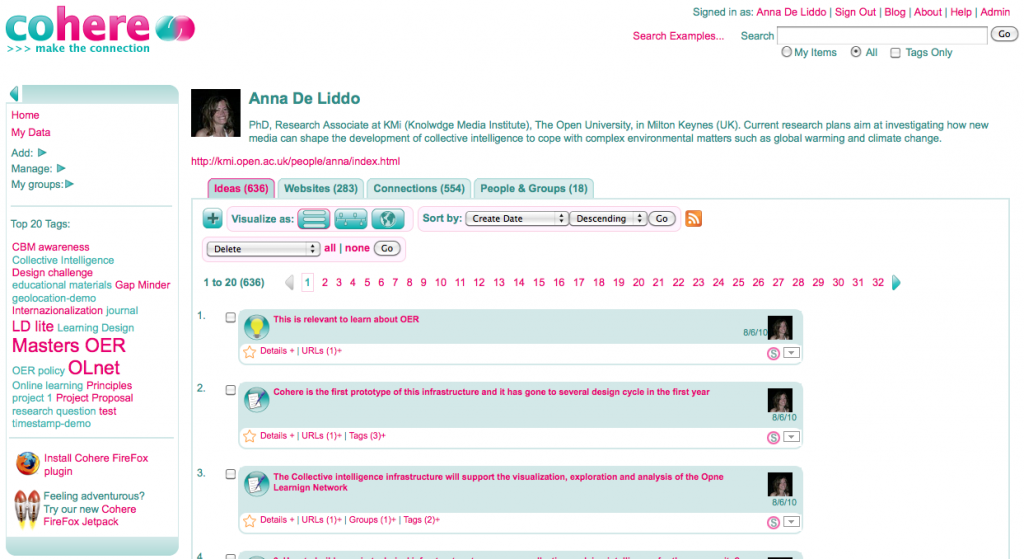
“Cohere is a web-centric knowledge mapping tool from the Open Sensemaking Communities project, working as part of the OU-wide OpenLearn initiative.
It enables you to:
- Record ideas, and add relevant websites
- Make meaningful connections between ideas
- Visualize the emerging network of your ideas, and the world’s, in different ways
- Import social bookmark feeds from tools like del.icio.us, ready for connecting
- Share maps as weblinks, or embed them in other website
Cohere relates to Compendium, our established knowledge mapping tool (a standalone Java application), as follows:
Cohere is web-centric, so you can share maps much more easily, and it generates dynamic maps on the fly (in Compendium you craft every map manually). Cohere is specifically for crafting a layer of interpretations over the web information ocean.
Compendium still does lots of things you can’t do in Cohere: templates, tagging, stencils, rich maps, and user interface optimisation for real time mapping
You can upload Compendium XML maps to Cohere, so Compendium can be used as an offline tool for creating maps; as established Compendium users, you may well find it a faster way to weave maps than the web interface.
Cohere is open-ended, providing default roles for IBIS-based Dialogue Mapping (Questions, Answers, Pros, Cons, etc) along with any other language of nodes+links (“ideas+connections”), although without Compendium’s layout options which are tuned to IBIS trees” – Simon Buckingham-Shum, November 22nd, 2007
Map View
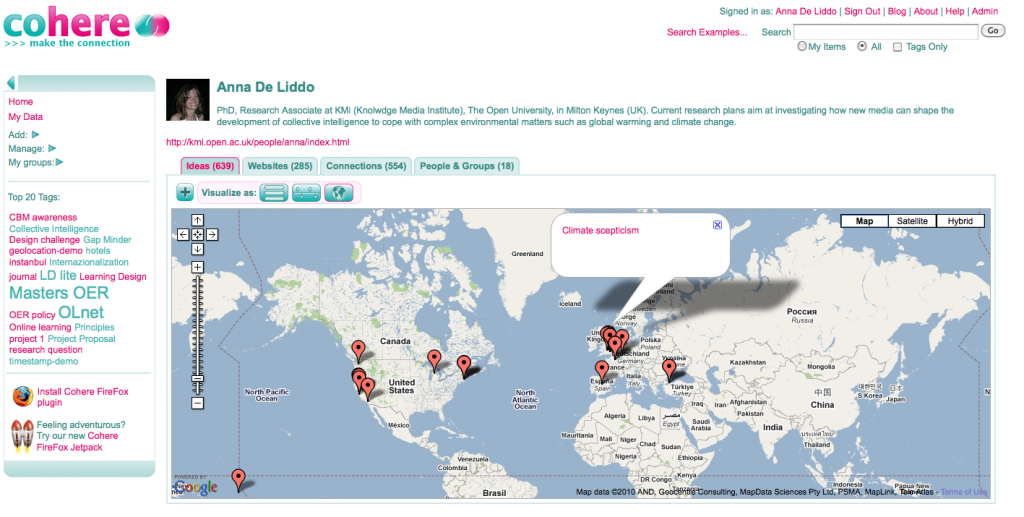
Connection Network View
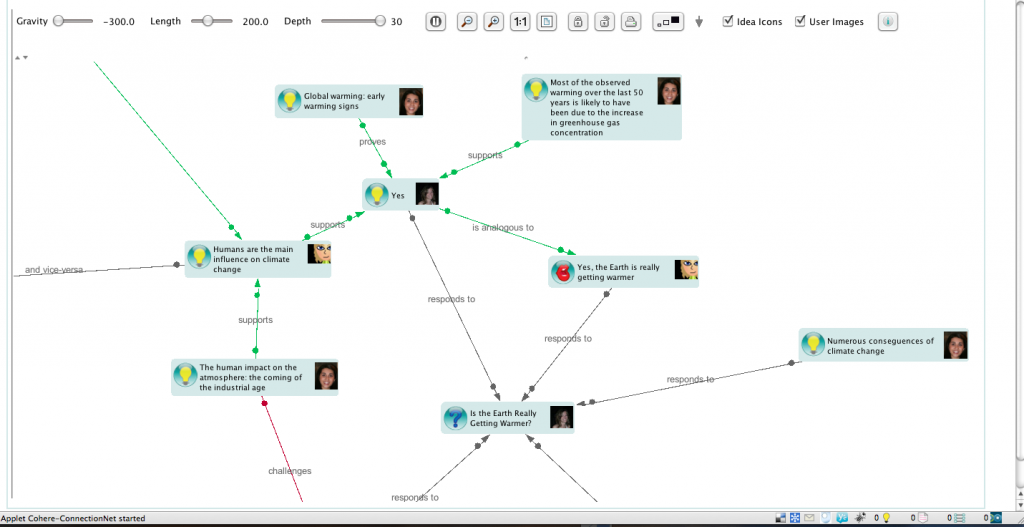
In the network view each idea or annotation is represented as a node and each semantic connection as a directed graph with semantic link label. Moreover, each node has an icon, an author (represented by a picture of the user who created that idea) and a label.
Timeline View
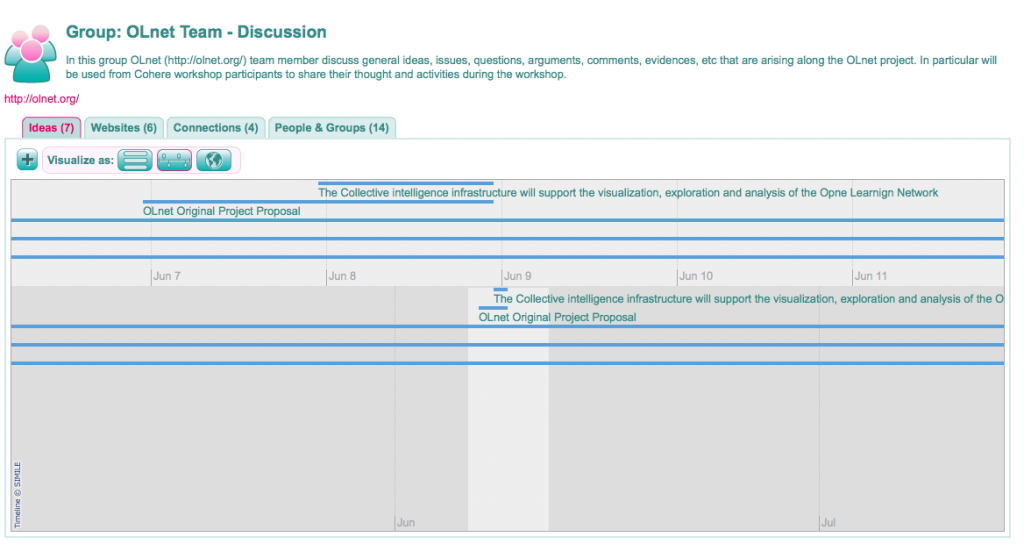
Videos
Cohere Introduction Movie: – by Alex Little
Using Cohere: – By Anna Deliddo
Projects
OpenLearn
https://kmi.open.ac.uk/projects/name/openlearn
OpenLearn was a university wide project, funded by William and Flora Hewlett Foundation (http://www.hewlett.org/). Cohere was developed as part of the Open University’s OpenLearn initiative, which publishes thousands of hours of OU course materials online for free access and remixing, together with free e-learning and social software tools. Cohere could be access from a side panel in both the OpenLearn LabSpace, an area used for remixing Open Educational Resources (OER), and on OpenLearn course pages themselves. Once signed into OpenLearn, users could jump straight into their Cohere workspace. Below is an example of a LabSpace OER, showing Cohere access from the bottom-left side panel.
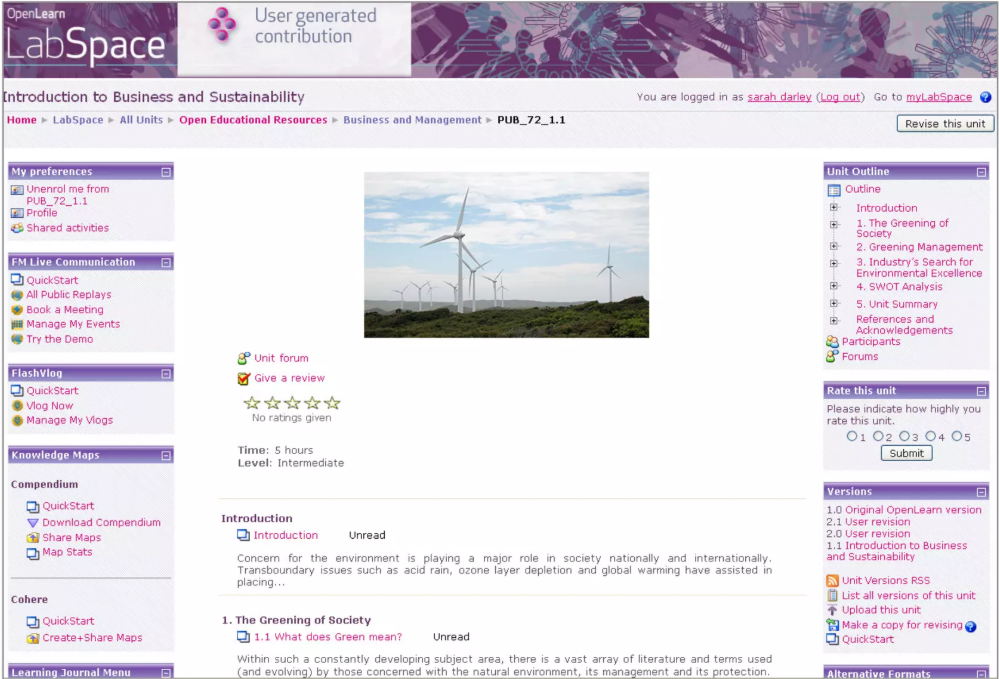
OLnet
https://kmi.open.ac.uk/projects/name/olnet
On this project, Cohere was used to gather Contested Collective Intelligence (CCI) around OER to help build on community thinking to make sense of the OER research world.
With Cohere, researchers and practitioners in Open Education could make their thinking visible and sharable with online communities; they could collaboratively annotate the Web, leverage lists of annotations into meaningful knowledge maps and engage in structured online discussion.
Below is a poster describing how Cohere was used on the Olnet project
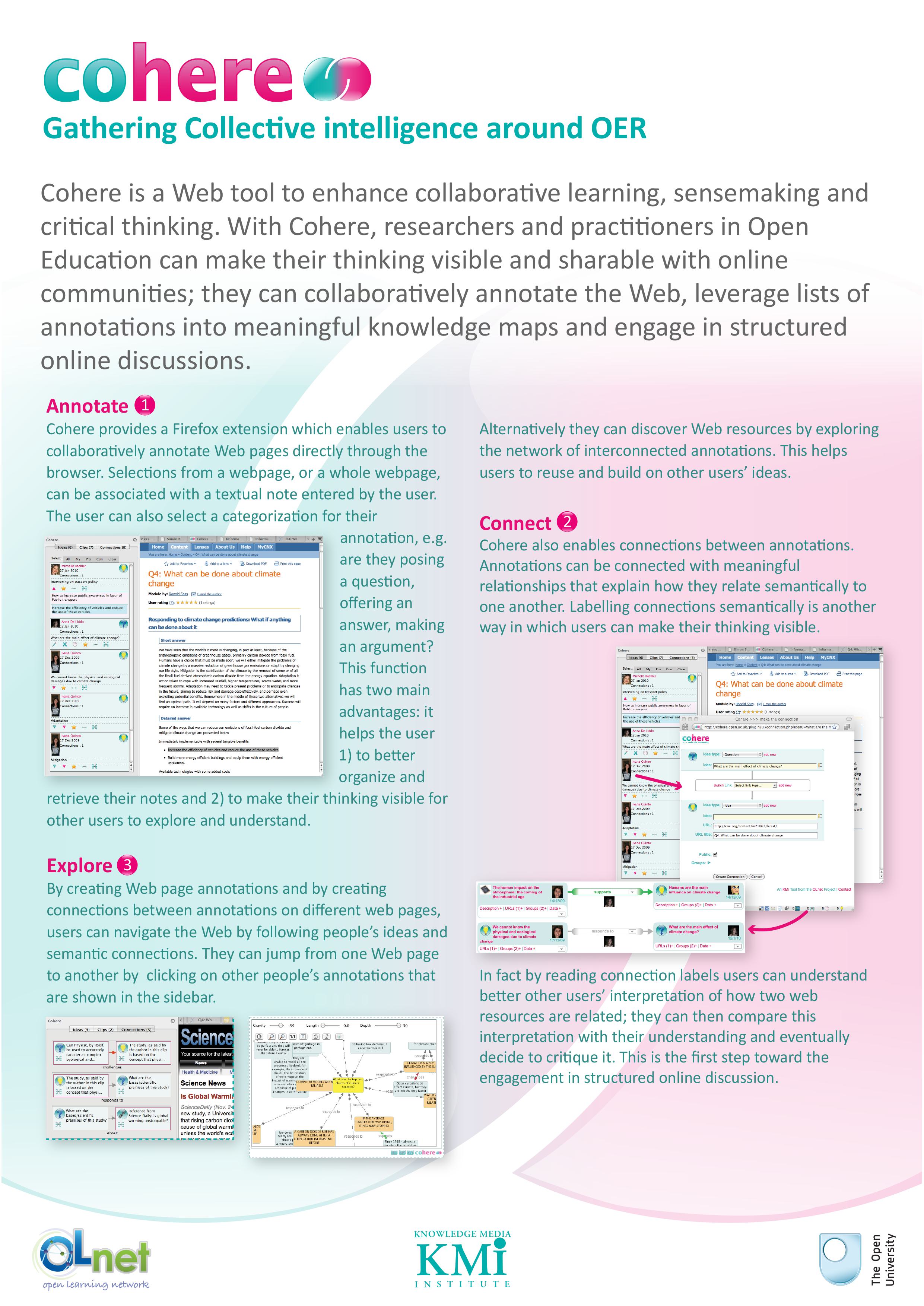
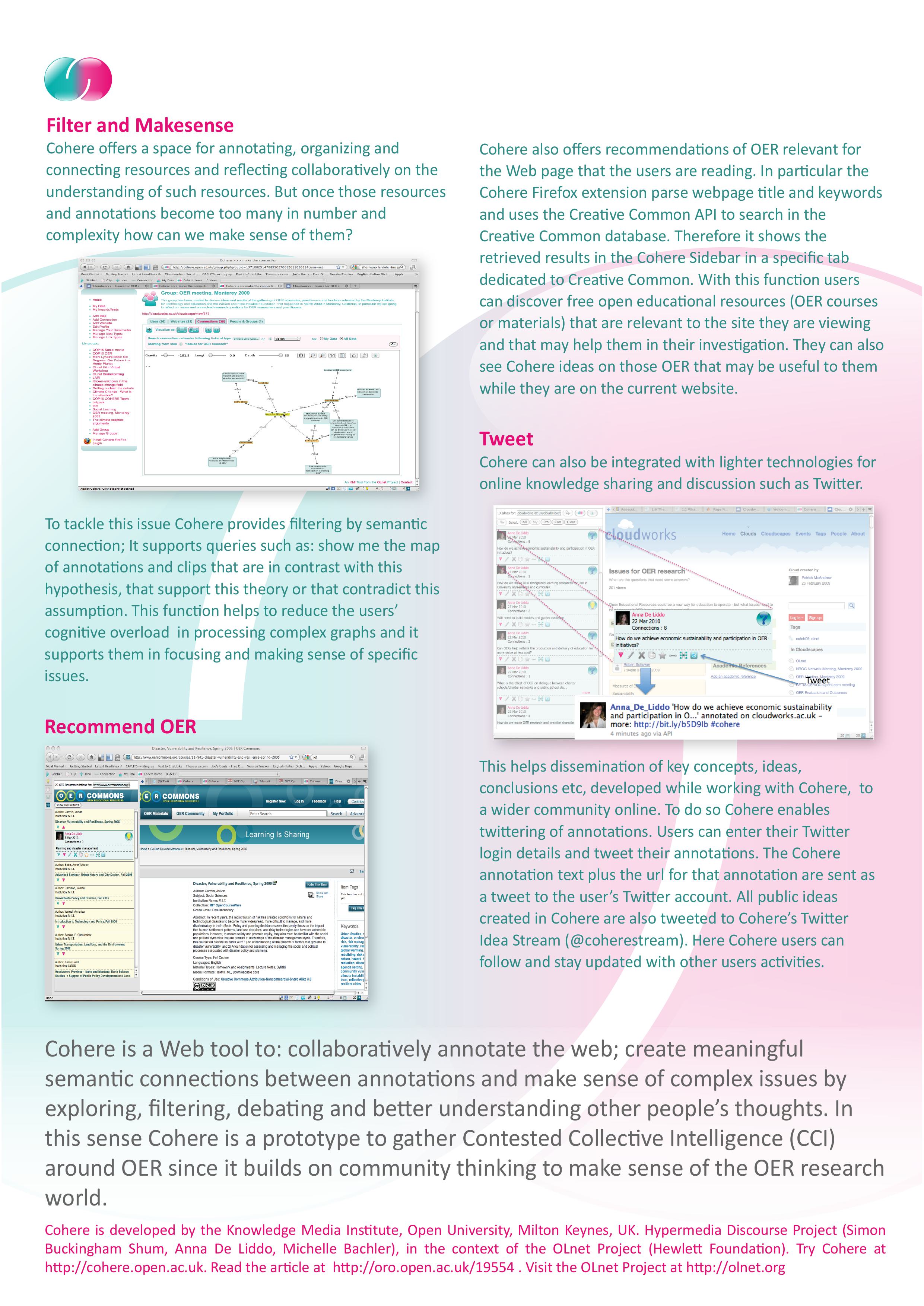
It was during our work on OLnet that we partnered with Xerox Research Centre Europe to integrated Cohere with their XIP parser.
In this video we demonstrate the practical application of research on human and machine annotation of online documents to support reflective reading and collective sensemaking of online documents. We present an innovative research prototype which integrate a discourse analysis software (XIP) with a Web Annotation and Knowledge-Mapping tool (Cohere).
We visualize an interactive scenario of use of the two integrated technologies in a unique user experience. This dynamic scenario will give an inspiring vision of future CSCW systems, which combine machine and human intelligence to enhance reasoning power.
This video has been presented to CSCW2012. Paper at: De Liddo, A., Sándor, Á. and Buckingham Shum, S. (2012, In Press). Contested Collective Intelligence: Rationale, Technologies, and a Human-Machine Annotation Study. Computer Supported Cooperative Work. Eprint: http://oro.open.ac.uk/31052
For the slide of the video storyboard go to: www.slideshare.net/AnnaDeLiddo1/cscw2012videostoryboard
Firefox Jetpack For Learning: Design Challenge competition

In 2009 we extended Cohere with a Jetpack plugin to enable users to create Cohere data entries linked to website content. We entered our Jetpack extension into the The Jetpack for Learning Design Challenge Competition that was run by Mozilla.
The Jetpack for Learning Design Challenge supported projects that turned the open web into a rich social learning environment. Developed by Mozilla Labs, a design challenge was an innovative combination of online seminar series, programming competition and hands-on workshop. After the first round of seminars, ten finalists were invited to attend Design Camp, a hands-on workshop for hacking Jetpack-based add-ons and the future of open education, which took place just before SXSW.

Cohere was one of the 10 finalists and the developer, Michelle, traveled to Austin, Texas to take part in the week-long Design Camp.
Below you can see the movie that was the Cohere entry into the Mozilla competition:
Team
Professor Simon Buckingham-Shum
Michelle Bachler – Software Development
Alex Little – Software Development
Harriett Cornish – Graphics
Source Code
For the source code for the Cohere website application, please visit our Git Hub: https://github.com/idea-kmi/Cohere. Note: the software is released under LGPL license.
Publications
Iandoli, L., Quinto, I., De Liddo, A. and Buckingham Shum, S. (2014) Socially Augmented Argumentation Tools: Rationale, Design and Evaluation of a Debate Dashboard, International Journal of Human-Computer Studies, 72, 3, pp. 298-319, Elsevier
De Liddo, A., (2012) Contested Collective Intelligence: Rationale, Technologies, and a Human-Machine Annotation Study, Computer Supported Cooperative Work
De Liddo, A., Buckingham Shum, S., McAndrew, P. and Farrow, R. (2012) The Open Education Evidence Hub: A Collective Intelligence Tool for Evidence Based Policy, Cambridge 2012: Joint OER12 and OpenCourseWare Consortium Global 2012 Conference, Cambridge, UK
Okada, A. (2011) Aprendizagem Significativa com Mapas para criancas, 1, 978-85-7769-099-2, pp. 146, Cuiaba: KCM
Okada, A. (2011) COLEARN 2.0: Refletindo sobre o conceito de COAPRENDIZAGEM via REAs na Web 2.0, in eds. DANIELA BARROS CLAUDIA NEVES FILIPA SEABRA JOSE MOREIRA SUSANA HENRIQUES, Educacao e tecnologías: reflexao, inovacao e praticas, 1, 978-989-20-2329-8, pp. 18, Lisbon: Universidade Aberta de Portugal
Buckingham Shum, S., Cannavacciuolo, L., De Liddo, A., Iandoli, L. and Quinto, I. (2011) Using Social network Analysis to Support Collective Decision-Making Process, International Journal of Decision Support System Technology, 3, 2, pp. 15-31, IGI Global.
De Liddo, A. and Panagiota, A. (2010) A Method and Tool to Support the Analysis and Enhance the Understanding of Peer-to-Peer Learning Experiences, OpenED2010: Seventh Annual Open Education Conference, Barcelona, Spain
Buckingham Shum, S. and De Liddo, A. (2010) Collective Intelligence for OER Sustainability, OpenED2010: Seventh Annual Open Education Conference, Barcelona, Spain
Quinto, I., Buckingham Shum, S., De Liddo, A. and Iandoli, L. (2010) A Debate Dashboard to Enhance On-Line Knowledge Sharing, Proceedings 5th International Forum on Knowledge Asset Dynamics (Intellectual Capital in a Complex Business Landscape), June 24-26, Matera, Italy
Quinto, I., Buckingham Shum, S., De Liddo, A. and Iandoli, L. (2010) A Debate Dashboard to Enhance On-Line Knowledge Sharing, IFKAD Conference – Intellectual Capital in a Complex Business Landscape, Matera Italy
De Liddo, A. and Buckingham Shum, S. (2010) Cohere: A Prototype for Contested Collective Intelligence, Workshop: Collective Intelligence In Organizations – Toward a Research Agenda at ACM Computer Supported Cooperative Work (CSCW 2010), Savannah, Georgia, USA
De Liddo, A. (2010) From Open Content to Open Thinking, World Conference on Educational Multimedia, Hypermedia and Telecommunications, Chesapeake, VA, pp. 3178-3183, AACE
McAndrew, P., Santos, A., Lane, A., Godwin, S., Okada, A., Wilson, A., Connolly, T., Ferreira, G., Buckingham Shum, S., Bretts, J. and Webb, R. (2009) OpenLearn Research Report 2006-2008